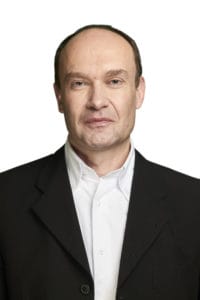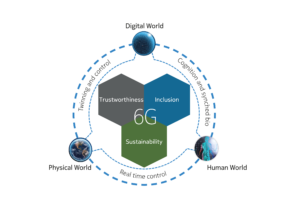The European Union’s flagship project on 6G

Peter Merz
Vice President,
Head of Nokia Standards
The world is just at the beginning of the 5G era, and yet researchers are already diving into the sixth generation of mobile communication technologies. The Hexa-X consortium is leading the European 6G effort with a diverse group of researchers, representing a broad cross-section of the industry and academia.
The project is being led by Nokia working closely with a strong consortium of European partners. They are preparing the foundation for future projects to come from the next big European initiative, Smart Network Services from the 5G Infrastructure Association (5G IA), while working with teams in other regions to create one 6G global standard for the world. A bit more than half a year into the two-and-a-half-year project, they have already delivered their vision, use cases and initial technical analysis for mobile networks in the 2030s.
The Hexa-X 6G vision
Hexa-X takes its name from the Greek for the number 6, with X representing the many, as-yet-unnamed capabilities of the 6G standard that may emerge. The project is part of the European Union’s Horizon 2020 research and innovation program, intended to boost the technical leadership of the EU and ensure that the new standard represents the goals and values of the European community. Building an ecosystem of businesses, academia and other organizations and key talent around the new standard will ensure that Europe takes long-term leadership on both fronts.
In their vision document published earlier this year, the consortium envisions 6G as a key societal platform for building efficient and sustainable ways of living, ensuring trust, security and privacy and creating economic prosperity and growth. With climate change high on their list of priorities, the consortium is especially interested in improving the energy efficiency of networks. Since 6G will play a crucial role in improving the efficiency of other systems important to the re-engineering of our carbon-based infrastructures, it must be engineered for minimal impact as well.
Consortium partners are also focused on digital inclusion, arguing that by 2030 connectivity will likely be regarded as a basic human right. They believe that the network, if designed properly, can contribute to greater trust, if built on principals of security, privacy, availability, resilience and compliance with ethical frameworks.
Trust is especially important, as 6G will be at the heart of the new age of automation and artificial intelligence. For people to accept the growing role of machines in our lives, much will have to be done to communicate the values promoted by 6G, as well as ensuring the privacy of data handling, network intelligence and the trustworthiness of AI.

6G three worlds wheel
Smart networks and services
In parallel, Hexa-X is also working with the 5G IA as it prepares for a broader effort to launch, in about a year’s time, the Smart Networks and Services (SNS). The SNS European Partnership aims to secure European leadership for the development and deployment of next-generation mobile networks. It is focused on 5G evolution and 6G. The 5G IA recently published a paper that outlines its European vision for the 6G network ecosystem. Hexa-X made a central contribution with other current EU research to the paper.
Continuing the themes of 5G, SNS sees 6G as continuing to provide a platform for connecting even more things, humans, robots and every kind of autonomous vehicle. But it also recognizes the key role the network will play in the evolution of society, as the digital, physical and human worlds increasingly converge. They also recognize the importance of the European Green Deal and the drive to achieve climate neutrality by 2050.
The importance of a global standard
Although a European initiative, the Hexa-X consortium is clear on the importance of arriving at a global consensus on the 6G standard. It will strive for openness and collaboration among the European and global research community, standardization bodies and policy makers.
Competition with regional initiatives is healthy for driving the development of the best possible technologies. However, the days of diverging mobile standards should be behind us. The consortium recognizes that we now live in a global economy with global supply chains, and the integration of our operational systems demands global standards. Achieving economies of scale is crucial for the success of today’s business models. Going it alone with a European-only approach would be self-defeating in the long run.
European research projects have been at the forefront of research for many generations of mobile networks. This strong experience and track record in collaborative research will be an advantage in achieving 6G leadership. And by presenting the values informing their vision for 6G, they hope to bring the rest of the world to a clearer understanding of both the performance- and value-oriented aspects of the technology and how it can play a key role in building a more sustainable, trusting and inclusive world.
Further information:
Hexa-X project website – https://hexa-x.eu